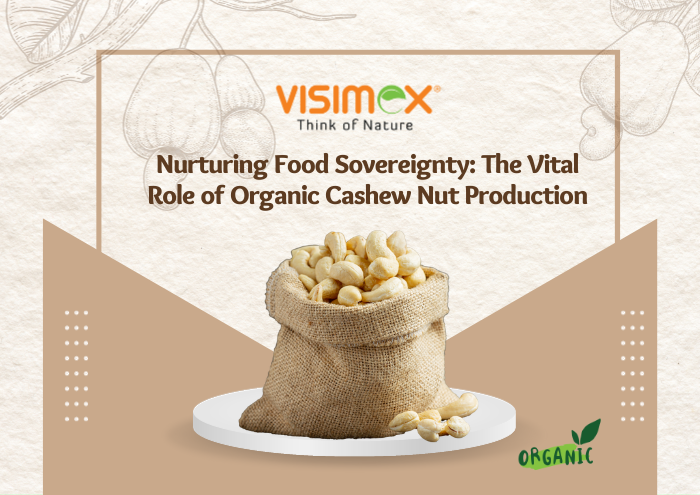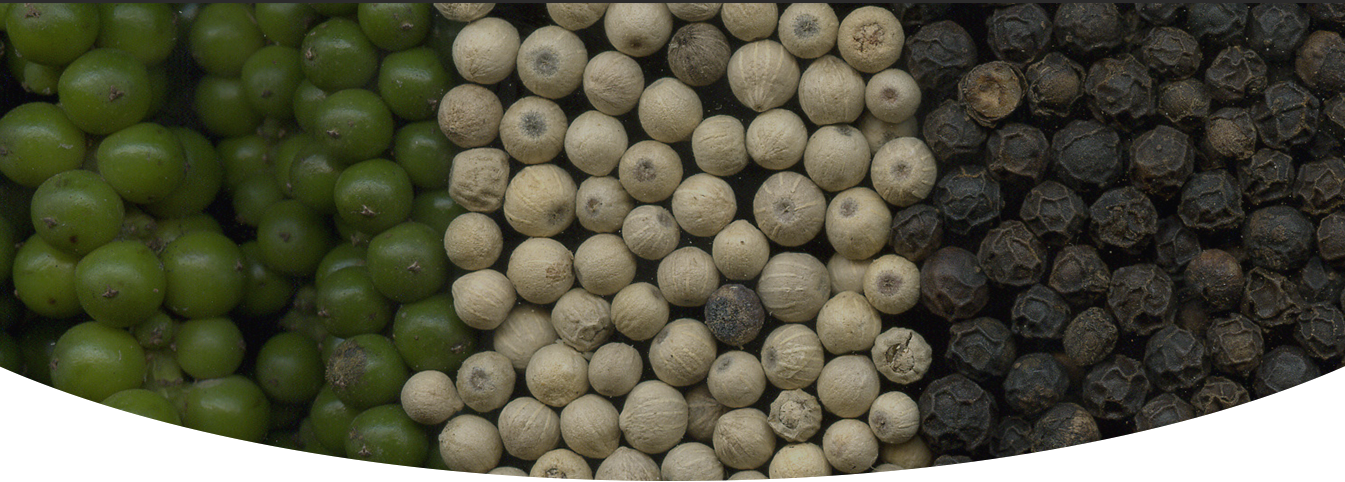In the pursuit of sustainable and resilient food systems, the spotlight increasingly turns to organic cashew nut production as a linchpin for achieving food sovereignty. This article delves into the multifaceted ways in which organic cashew nut cultivation contributes to local empowerment, biodiversity conservation, and the enhancement of food sovereignty within communities.

Empowering Local Communities
The cultivation of organic cashew nuts serves as a transformative force, empowering local communities by placing control over agriculture back into the hands of small-scale farmers. Embracing sustainable practices enhances environmental and economic sustainability, reducing dependence on external inputs like synthetic fertilisers. This commitment fosters a sense of autonomy, enabling communities to assert control over their food production. Moreover, organic cashew farming often integrates diverse agricultural systems, promoting varied and nutritious diets within local populations. The holistic approach enhances overall community well-being and creates a symbiotic relationship between sustainable agriculture and the empowerment of local residents. In essence, organic cashew nut production becomes a cornerstone for nurturing self-sufficiency, resilience, and economic empowerment within the fabric of local communities, contributing to a more sustainable and sovereign future.
Diverse and Nutritious Diets
The cultivation of organic cashew nuts plays a pivotal role in fostering diverse and nutritious diets within local communities. Unlike conventional monoculture, organic cashew farming often integrates diverse agricultural systems, allowing farmers to cultivate an array of crops alongside cashews. This diversification contributes to more varied diets, promoting holistic nutrition and reducing dependence on a single staple. The cultivation of complementary crops not only enhances the nutritional content of local diets but also reinforces the principles of sustainable and resilient agriculture. In embracing organic practices, farmers prioritise soil health and biodiversity, creating an environment that supports a rich tapestry of crops. Consequently, the integration of organic cashew nuts into diverse agricultural systems becomes a powerful strategy for enhancing food security, promoting balanced nutrition, and contributing to the overall well-being of communities
Preserving Cultural Heritage
Organic cashew nut cultivation serves as a guardian of cultural heritage, intertwining traditional practices with sustainable agriculture. By aligning with indigenous farming methods, organic cashew farming preserves centuries-old wisdom and cultural knowledge passed down through generations. The commitment to organic practices not only ensures environmental sustainability but also safeguards the unique identity of local communities. The cultivation of cashews within the context of traditional methods becomes a testament to the preservation of cultural heritage, maintaining a delicate balance between modern agricultural needs and the rich tapestry of indigenous practices. As farmers adhere to organic principles, they contribute to the resilience and continuity of cultural traditions, creating a sustainable legacy that honours the past while nurturing the future. The organic cultivation of cashew nuts thus emerges not merely as an agricultural endeavour but as a custodian of cultural heritage, fostering a harmonious coexistence between tradition, sustainability, and the preservation of identity within local communities.
Environmental Stewardship
Cultivating organic cashew nuts embodies a commitment to environmental stewardship, championing sustainable and eco-friendly agricultural practices. Rejecting synthetic pesticides and fertilisers, organic cashew farming prioritises soil health, biodiversity, and reduces harmful chemical runoff. This approach safeguards water sources and local ecosystems, contributing to a more sustainable agricultural landscape. Moreover, embracing organic methods often involves agroforestry, integrating cashew orchards with native vegetation for increased biodiversity. The conscientious practices of organic cashew nut production epitomise the harmonious coexistence between agriculture and environmental preservation. By choosing organic, farmers become stewards of the earth, fostering a sustainable model that prioritises the well-being of both the land and local ecosystems
Building Community Resilience
The cultivation of organic cashew nuts plays a pivotal role in building community resilience by fostering sustainable agricultural practices that withstand environmental challenges. Organic farming methods, which prioritise climate-resilient approaches such as agroforestry and water conservation, contribute to the overall resilience of cashew farming communities. By adopting sustainable practices, these communities become better equipped to endure the impacts of climate change, ensuring a consistent and reliable source of livelihood. Additionally, organic cashew farming empowers communities economically by reducing dependence on external inputs, making them less susceptible to market fluctuations. Through the integration of diverse crops and eco-friendly practices, organic cashew nut production becomes a cornerstone for fostering resilient communities that can adapt to evolving environmental conditions while sustaining their agricultural traditions
Reducing Dependence on External Inputs
Reducing dependence on external inputs is a hallmark of organic cashew nut cultivation, marking a shift towards self-sufficiency and sustainability. Unlike conventional farming reliant on synthetic fertilisers and pesticides, organic practices prioritise locally available resources, fostering soil health and biodiversity. This strategic move not only mitigates environmental impact but also bolsters economic stability. By decreasing reliance on costly external inputs, farmers gain autonomy, reducing vulnerability to market fluctuations and ensuring more consistent yields. The focus on efficient resource utilisation within organic cashew nut production underscores a commitment to a resilient and self-reliant agricultural system. This reduction in dependence not only benefits the environment but also positions cashew farming communities for long-term success, aligning with the principles of sustainable and sovereign agriculture.

Fair Trade Principles
Fair trade principles are integral to the ethical foundation of organic cashew nut production. Embodying a commitment to social and economic justice, fair trade ensures that farmers receive fair compensation for their products, empowering them and contributing to community development. In the context of organic cashew nut cultivation, adherence to fair trade principles means that farmers are guaranteed equitable wages, safe working conditions, and sustainable farming practices. This ethical approach extends to fostering direct relationships between producers and consumers, cutting out unnecessary intermediaries and promoting transparency in the supply chain. By prioritising fair trade, organic cashew nut production becomes a force for positive change, addressing economic disparities and promoting ethical consumer choices that support the livelihoods of farmers and their communities.
Organic cashew nut production emerges not just as an agricultural endeavour but as a powerful force in nurturing food sovereignty. By empowering local communities, fostering diverse and nutritious diets, preserving cultural heritage, prioritising environmental stewardship, building resilience, reducing dependence on external inputs, and adhering to fair trade principles, organic cashew nut cultivation becomes a cornerstone for sustainable and sovereign food systems within communities. The journey towards food sovereignty is intricately woven into the fabric of organic cashew nut production, pointing towards a more resilient and self-sufficient future for communities worldwide.
In the pursuit of fair trade principles within the organic cashew nut industry, exemplary leaders such as Visimex stand out as pioneers in organic agriculture in Vietnam. With over 20 years of experience exporting Vietnamese agricultural products, Visimex has played a crucial role in promoting fair and ethical practices. Their commitment to fair trade aligns seamlessly with the principles of social and economic justice, ensuring that farmers receive fair compensation for their organic cashew nuts. Visimex’s direct involvement in supporting sustainable farming practices and empowering local communities exemplifies the transformative impact of fair trade principles in the organic cashew industry. As a trailblazer in ethical agriculture, Visimex sets a standard for responsible and transparent supply chains, creating a positive ripple effect that advances both fair trade and sustainable farming practices within the organic cashew nut sector.











